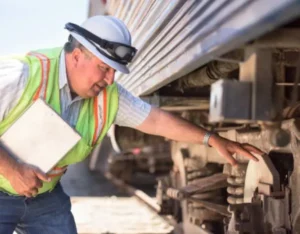At Kelner & Kelner, we regularly assist railroad workers who have been injured on the job in understanding their rights under the Federal Employers Liability Act (FELA). What is FELA? It's a federal law that provides critical protections for railroad workers who suffer injuries during their employment. Unlike standard workers' compensation systems, FELA offers unique benefits and requires specific legal approaches to secure fair compensation.
Free Consultation - Act Now
Injured in NYC? Contact Kelner and Kelner today at (212) 235-1027 or through our website.
What is FELA (Federal Employers Liability Act)?
FELA (Federal Employers Liability Act) is a federal law passed in 1908 that specifically protects railroad workers injured on the job. Unlike standard workers' compensation, FELA allows railroad employees to sue their employers for injuries caused by workplace negligence.
What makes the Federal Employers Liability Act distinct is that while workers' compensation typically provides automatic but limited benefits regardless of fault, FELA requires workers to prove their employer's negligence contributed to their injuries - even if only partially. In return, the Federal Employers Liability Act allows for more comprehensive compensation, including damages for pain and suffering, lost wages, medical expenses, and diminished quality of life that aren't typically available through workers' compensation.
The Historical Context of FELA
To understand what is FELA, we must look back to its origins in 1908. During the early 20th century, railroad work was exceptionally dangerous, with thousands of workers losing their lives or suffering severe injuries annually. The public outcry over these conditions led President Theodore Roosevelt to champion workers' rights, resulting in FELA's creation. This landmark legislation established new standards for railroad worker safety and created a legal framework for injured workers to seek compensation.
How FELA Differs from Workers' Compensation

When examining what is FELA, it's crucial to recognize its fundamental differences from standard workers' compensation systems. While workers' compensation typically provides automatic but limited benefits regardless of fault, FELA operates on a fault-based system. Under FELA, railroad workers must demonstrate that their employer's negligence contributed to their injuries, even if only partially.
A FELA lawyer understands that this fault-based system can actually benefit workers, as it allows for more comprehensive compensation including:
- Past and future medical expenses
- Lost wages and diminished earning capacity
- Physical pain and emotional suffering
- Loss of quality of life
- Permanent disability compensation
Key Components of FELA Claims
At Kelner & Kelner, we help railroad workers understand what is FELA and its essential requirements for a successful claim. For a FELA claim to be valid and provide compensation, several key components must be present:
- Employer-Employee Relationship: The injured person must be employed by a railroad company engaged in interstate commerce at the time of the injury. This employment status is fundamental to establishing FELA coverage.
- Interstate Commerce: The railroad company must be operating in interstate commerce, meaning its activities cross state lines or affect interstate commerce. This federal requirement distinguishes FELA from state-based workers' compensation systems.
- Negligence: Unlike standard workers' compensation, FELA requires proof that the railroad company failed to provide a reasonably safe workplace. This can include inadequate training, faulty equipment, or unsafe working conditions.
- Causation: There must be a direct link between the railroad's negligence and the worker's injury. Even if the railroad's negligence played only a small part in causing the injury, it may still be sufficient for a FELA claim.
- Statute of Limitations: Claims must be filed within three years of the injury date or when the injury was discovered. For occupational diseases, this timeframe begins when the worker knew or should have known about the condition.
- Damages Documentation: Clear evidence of physical injuries, medical expenses, lost wages, pain and suffering, and other damages must be thoroughly documented to support the claim.
- Railroad Safety Violations: Any violations of federal safety regulations by the railroad can strengthen a FELA claim by establishing negligence per se, making it easier to prove liability.
- Comparative Negligence: Under FELA, damages may be reduced by the percentage of fault attributed to the worker, but unlike other systems, even if the worker is mostly at fault, they can still recover damages.
As a FELA lawyer team serving railroad workers, we understand that meeting these requirements demands careful attention to detail and thorough documentation. If you've been injured while working for a railroad, understanding these components is crucial for protecting your rights and securing the compensation you deserve under the Federal Employers Liability Act.
Types of FELA Claims
At Kelner & Kelner, we regularly handle FELA claims for railroad workers who have suffered various types of injuries. What is FELA designed to cover? Here are the most common types of claims we encounter under the Federal Employers Liability Act:
- Physical Impact Injuries: Accidents involving collisions with equipment, falling objects, or being struck by moving trains or machinery. These often result in severe trauma requiring immediate medical attention.
- Repetitive Motion Trauma: Long-term damage from performing the same physical tasks repeatedly, such as operating controls, lifting heavy equipment, or maintaining track components. These injuries often develop gradually over months or years.
- Toxic Exposure Claims: Illness or injury from contact with harmful substances like asbestos, diesel fumes, or chemical solvents. Railroad workers may develop serious respiratory conditions or other health issues from prolonged exposure.
- Slip and Fall Accidents: Injuries resulting from unsafe walking surfaces, inadequate lighting, or hazardous weather conditions in railroad yards, on trains, or in maintenance facilities. These can lead to serious back, neck, or head injuries.
- Equipment Malfunction: Injuries caused by defective tools, faulty machinery, or improperly maintained railroad equipment. These incidents often result in crushing injuries, amputations, or severe trauma.
- Hearing Loss Claims: Permanent damage to hearing from prolonged exposure to loud engines, horns, and other railroad operations without proper protective equipment.
- Back and Neck Injuries: Trauma from heavy lifting, awkward positions during maintenance work, or the physical demands of railroad operations. These injuries can lead to chronic pain and disability.
- Occupational Illnesses: Long-term health conditions developed from workplace conditions, including lung diseases, carpal tunnel syndrome, and other medical conditions directly related to railroad work.
Understanding what is FELA and the types of claims it covers is crucial for railroad workers seeking compensation for their injuries. If you've experienced any of these types of injuries while working for a railroad, it's important to understand your rights under FELA and seek appropriate legal guidance to protect your interests.
Time Limitations and Legal Considerations For FELA Claims
A critical aspect of what is FELA involves understanding the statute of limitations. Railroad workers typically have three years from the date of injury to file a FELA claim. However, for occupational diseases that develop over time, the clock may start running from when the worker knew or should have known about the condition and its connection to their railroad work.
The FELA Claims Process
At Kelner & Kelner, we guide railroad workers through what is FELA and the critical steps involved in pursuing a claim. Understanding this process is essential for protecting your rights under the Federal Employers Liability Act. Here's a detailed breakdown of how a FELA claim typically progresses:
- Initial Reporting: Report your injury to your supervisor immediately and complete an official incident report. Accurate documentation from the start is crucial for establishing your FELA claim's foundation.
- Medical Evaluation: Seek immediate medical attention, even for seemingly minor injuries. Your healthcare provider should thoroughly document all injuries and establish a clear connection between your work conditions and health issues.
- Legal Consultation: Meet with a FELA lawyer to discuss your case and understand your rights. During this meeting, we'll evaluate the circumstances of your injury and outline potential strategies for your claim.
- Evidence Collection: Gather all relevant documentation, including accident reports, witness statements, photographs, maintenance records, and safety logs. This evidence helps establish the railroad's negligence and your damages.
- Medical Documentation Review: Compile and analyze your complete medical records, including treatment plans, diagnostic tests, and expert opinions about your long-term prognosis. This information helps quantify your current and future medical needs.
- Damage Assessment: Calculate all losses, including medical expenses, lost wages, pain and suffering, and diminished earning capacity. This comprehensive evaluation ensures we seek appropriate compensation for all aspects of your injury.
- Settlement Negotiations: Engage in discussions with the railroad's representatives to reach a fair settlement. We present your case backed by solid evidence and negotiate for maximum compensation under the Federal Employers Liability Act.
- Litigation Preparation: If settlement negotiations don't yield satisfactory results, prepare for court proceedings. This includes filing necessary legal documents, developing trial strategy, and preparing evidence presentation.
- Resolution: Either reach a settlement agreement or proceed to trial, where a judge or jury will determine the outcome of your FELA claim. Throughout either process, we advocate for your best interests.
- Post-Resolution Support: After your case concludes, we ensure proper distribution of compensation and address any ongoing legal needs related to your FELA claim.
We understand what is FELA designed to provide - comprehensive compensation for injured railroad workers. Each step in this process requires careful attention to detail and thorough legal knowledge to protect your rights and secure the benefits you deserve. Whether through settlement or trial, we remain committed to achieving the best possible outcome for your case.
Types of Injuries Covered Under The Federal Employers Liability Act
At Kelner & Kelner, we help railroad workers understand what is FELA and the wide range of injuries it covers. Under the Federal Employers Liability Act, you may be eligible for compensation for various types of railroad accident injuries sustained during railroad employment. Here's a comprehensive list of compensable injuries:
- Traumatic Brain Injuries: Concussions, contusions, and other head trauma from impacts, falls, or equipment accidents that can cause long-term cognitive and physical impairments. These injuries often require extensive rehabilitation and ongoing medical care.
- Spinal Cord Damage: Injuries to the back or neck from accidents, heavy lifting, or repetitive motions that may result in partial or complete paralysis. These life-altering injuries typically require substantial compensation for lifetime care needs.
- Crush Injuries: Severe trauma from being caught between railroad equipment, machinery, or cargo that can lead to permanent disability or limb loss. These catastrophic injuries often result in significant FELA compensation claims.
- Burns and Electrocutions: Injuries from fires, chemical exposure, or electrical accidents that can cause severe tissue damage and scarring. Treatment may require multiple surgeries and long-term rehabilitation.
- Repetitive Stress Injuries: Cumulative trauma from performing the same motions repeatedly, such as carpal tunnel syndrome or tendonitis. These conditions often develop over time and may require ongoing medical treatment.
- Respiratory Conditions: Lung diseases and breathing problems from exposure to diesel fumes, asbestos, or other toxic substances in the railroad environment. These occupational illnesses may take years to develop but are fully compensable under FELA.
- Hearing Loss: Permanent auditory damage from prolonged exposure to loud machinery, train horns, and other railroad noise. This common occupational injury can significantly impact quality of life and work capacity.
- Orthopedic Injuries: Broken bones, joint injuries, and soft tissue damage from accidents, falls, or overexertion that may require surgery and extended recovery periods.
- Psychological Trauma: Mental health conditions including PTSD, anxiety, or depression resulting from traumatic incidents or the cumulative stress of railroad work. These non-physical injuries are recognized and compensable under FELA.
- Fatal Injuries: In cases of death, FELA provides compensation to surviving family members for loss of financial support, guidance, and companionship. These wrongful death claims require careful handling to ensure proper compensation for the family.
The Important Role a FELA Claims Lawyer Plays

At Kelner & Kelner, we believe it's crucial to understand what is FELA and the vital role legal representation plays in these complex claims. Here's how our law firm assists railroad workers throughout their FELA claims process:
- Initial Case Evaluation: Conduct a thorough assessment of your injury circumstances, workplace conditions, and potential liability issues to determine the strength of your FELA claim. This critical first step shapes the entire legal strategy.
- Evidence Preservation: Act quickly to secure and preserve essential evidence before it disappears or becomes altered. This includes obtaining surveillance footage, maintenance records, and witness statements while memories are fresh.
- Medical Guidance: Direct clients to appropriate medical professionals who understand railroad injuries and can properly document conditions for The Federal Employers Liability Act Claims. Proper medical documentation strengthens your case and supports your compensation claim.
- Negligence Investigation: Investigate all aspects of railroad operations that may have contributed to your injury, including equipment maintenance, training procedures, and safety protocols. This helps establish the railroad's liability under the Federal Employers Liability Act
- Damage Calculation: Accurately assess all forms of damages, including future medical needs, lost earning capacity, and non-economic losses like pain and suffering. This comprehensive evaluation ensures you seek full compensation under FELA.
- Railroad Interaction: Handle all communications with railroad representatives and their insurance companies. This protects you from making statements that could harm your claim and ensures your rights are protected.
- Legal Strategy Development: Create a customized legal approach based on the specific details of your case, injury type, and railroad's safety record. This strategic planning maximizes your chances of a favorable outcome.
- Settlement Negotiation: Leverage our understanding of what is FELA and previous case outcomes to negotiate effectively with railroad companies. We work to secure fair compensation without the need for lengthy court proceedings when possible.
- Trial Preparation: If settlement isn't achievable, prepare a compelling case for trial including expert testimony, evidence presentation, and legal arguments. Our trial experience ensures your case is properly presented to a judge or jury.
- Long-term Protection: Consider the future implications of any settlement or verdict, including structuring compensation to protect your long-term interests and ensuring all future medical needs are covered.
At Kelner & Kelner, our role as FELA lawyers extends beyond just legal representation – we serve as advocates, advisors, and protectors of your rights throughout the entire claims process. Understanding what the Federal Employers Liability Act and its complexities requires dedicated legal knowledge, and we're committed to using our experience to help you secure the compensation you deserve for your railroad workplace injury.
Contact Our New York Railroad Injury Team Today
If you've been injured while working for a railroad, don't wait to seek legal guidance. At Kelner & Kelner, we're committed to protecting railroad workers' rights under FELA. Let us help you understand your options and secure the compensation you deserve. Contact us for a confidential consultation about your FELA claim.
Free Consultation - Act Now
Injured in NYC? Contact Kelner and Kelner today at (212) 235-1027 or through our website.



